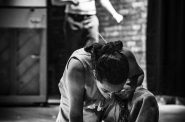“Electra” rises again, at Theatre Gigante
Isabelle Kralj's new take on the ancient Greek myth synthesizes interpretations from classic and contemporary sources with dance for a powerful retelling of this tale of vengeance.
 Of the ancient Greek tragedies to survive, the tale of Electra is one of the most enduring. The daughter of Agamemnon, forced to live beneath the roof of the mother and cousin who killed him and wait for revenge, has a work to call her own in the works of all three extant tragedians (Aeschylus, Sophocles and Euripides, although her role varies in each’s play), and has been subject to reinvention ever since.
Of the ancient Greek tragedies to survive, the tale of Electra is one of the most enduring. The daughter of Agamemnon, forced to live beneath the roof of the mother and cousin who killed him and wait for revenge, has a work to call her own in the works of all three extant tragedians (Aeschylus, Sophocles and Euripides, although her role varies in each’s play), and has been subject to reinvention ever since.
Theatre Gigante is the latest to define Electra on their own terms, taking as their foundations her treatment in Hungarian director Miklos Jansco’s film Electra, My Love as much as in the works of Sophocles and Euripides. To that framework, which casts Electra in the role of a revolutionary against a tyrannical dictatorship, they’ve added dance, as the interdisciplinary company is wont to do, giving the proceedings a ritualistic, heavily symbolic feeling.

Aegisthus’ (Craig Menteer) command over his kingdom is absolute, even extending to propaganda passed out to the audience.
Adapter and director Isabelle Kralj plays the lead role in her Electra, which centers around her dynamic with her father’s cousin and killer Aegisthus (Craig Menteer), the new tyrant king. The two are the least dancer-ly roles in the production, but they draw the eye nonetheless, Kralj with her fiery, scarcely restrained passion and Menteer with his cold, calculating presence. In a quasi-mystical sense, neither can slay the other, and must exist in counterpoint seemingly forever.
Throughout, both are haunted by the specter of Agamemnon (Edwin Olvera), and Electra’s exiled brother Orestes (Joe Fransee). Olvera never speaks, but wordlessly lingers against the wall offstage – until the instant he’s not, already halfway across the room in a running, cartwheeling, somersaulting dance that perfectly conveys his restless soul. He pauses only for moments with his children, giving each other an instant of comfort before he flies off again.
In Orestes’ case, the moments seem to also serve the purpose of contrasting the slim, thoughtful exile with his lithe, warlike father. Fransee plays Orestes with the singleminded goal of killing his father’s usurper, but his efforts at solo subterfuge with Aegisthus prove merely emasculating, and Electra herself is able to overpower him when they first meet, before she learns his true identity. He becomes an excuse for her to act and an ally, or perhaps just the knife she wields.

“Electra’s” five-woman chorus accompany the drama on stage, as representatives of the Grecian people. Pictured from left: Megan Kaminsky, Molly Corkins, Katie Rhyme.
Many things surround this four-player drama. A five-woman chorus is the most obvious and omnipresent. Clad in simple blacks and purples, these women (Molly Corkins, Jessie Mae Scibek, Joelle Worm, Megan Kaminsky and Katie Rhyme) stand in for the people of Greece, alternately oppressed and oppressors. They have too many glorious moments of dance and performance to relay in full here, but their grieving dance of silent screams at Agamemnon’s assassination is particularly poignant, as are Scibek’s occasional turns as Clytemnestra, Electra and Orestes’ mother. It’s also hard not to love the scene where they turn into propagandists, robotically chanting platitudes to their great leader and passing out creepy flyers to the audience.
They are also surrounded by the voices of Suzette Nelson and Mark Anderson, who serve as both narrators and stand-ins for Electra’s uncast characters, including their sister Chrysothemis and the old man who raised Orestes. It’s in the former role that their presence has more strength, especially when Nelson narrates through song. Without actually being on stage, their lines, often culled from translations of the ancient Greek plays, can be distracting, and would be better reduced or given to the primary actors themselves.
Seth Warren-Crow’s soundscapes provide the final enveloping layer. From behind a drumset, he cues up ambient thrums and throbs that pulsate intermittently through the show. They’re organized precisely to ratchet up the already-intense play, and reach their peak at the play’s climactic final moments, when Electra and Orestes teeter on the precipice between being revolutionaries and mere revengers. Either way, it’s a fall, but one worth watching.
Theatre Gigante’s production of Electra runs through May 18 at Kenilworth Studio 508. All shows are at 7:30 p.m. and tickets are $16.50 to $26.50. Order online or at (414) 229-4308.
Dance
-
New Riverwest Company, Production Impresses
 Feb 10th, 2020 by Brendan Fox
Feb 10th, 2020 by Brendan Fox
-
Milwaukee Ballet Show Remakes History
 Feb 10th, 2020 by Catherine Jozwik
Feb 10th, 2020 by Catherine Jozwik
-
Ballet Does Free Production of ‘Nutcracker’
 Dec 20th, 2019 by Richard Davis
Dec 20th, 2019 by Richard Davis
Theater
-
‘The Treasurer’ a Darkly Funny Family Play
 Apr 29th, 2024 by Dominique Paul Noth
Apr 29th, 2024 by Dominique Paul Noth
-
Rep’s Nina Simone Play a Puzzle
 Apr 23rd, 2024 by Dominique Paul Noth
Apr 23rd, 2024 by Dominique Paul Noth
-
Skylight’s ‘Eternity’ Is a Slam Bang Show
 Apr 15th, 2024 by Dominique Paul Noth
Apr 15th, 2024 by Dominique Paul Noth





















